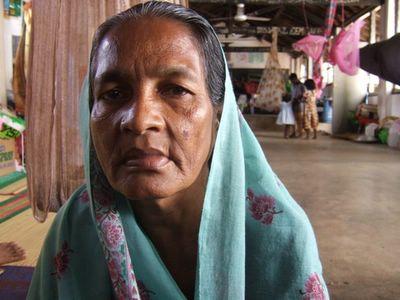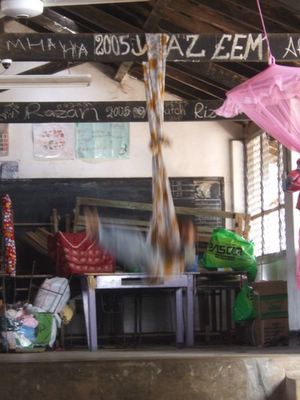
Riyaz Rookaiya (3 1/2) and Fathima Hasan Zahani (2 1/2) play in the welfare centre
Civilians caught in the cross fire
The total population of Muthur before displacement was 63,690 persons (47,272 families). Out of these Muslims were 52.5% (35,319 families) , Tamil were 47.3% (28,199), and Sinhalese were 1.7% (172 families) . Men were 31,383, and women were 32,307 according the Muthur divisional secretariat based on the survey carried out in December 2005.There are 96 villages in Muthur divisional secretariat area.
So far 50,259 Muthur civilians have been registered as displaced. The total Internally Displaced People as at 9 am on August 8 th 2006 in camps were 41,270 persons (Trincomalee Town 6 camps- 2828 persons, Kantale 8 camps- 19,880 persons, Seruwila 16 camps -10,292 persons, Kinniya 6 camps- 1678 persons, Thampalagamam 9 camps- 6592 people and one camp in Negombo-153 persons.) The people left to other districts such as Kurunegala, Anuradhapura, Polonnaruwa, Kandy and Colombo as well.
There are 33 families (153 persons) arrived in Negombo from Kantale on August 8th 2006 at 2am. They are staying at Al-Hilal Central College in Periaymullai, Negombo. There are 73 men, and 80 women staying here. The people will be relocated in Kamachoda Jumma Mosque compound tomorrow, in order to hand over the Al-Hilal Central College buildings back to start classes.
They were not displaced outside Muthur during the height of war in 1990s. This is the first time that, they are displaced to a longer distance.
The following information is gathered from various witnesses among the Internally Displaced People from Muthur.
“They were told to leave Muthur immediately by the Liberation Tigers of Tamil Eelam. The people of Muthur sought refuge in schools and mosques, which came under attack of the Sri Lankan forces. People started to move again from place to place. The LTTE diverted the fleeing Muslims from the main road (A15) to their controlled area which had a check point established with many cardres on the spot.
The men were separated by the LTTE from women, and told the women and children to move on. But many women refused to leave , until the men are freed. Some men were released, the rest is still missing. They were taken 200 hundred yards away from the rest of the crowd. Their hands were tied at back. The loved ones of those who are still missing do not know what has happened to them so far.
At the same time the Sri Lankan forces continued to fire multi-barrel launchers, which led the fleeing families to run in different directions. No one knows exactly whether they would have been killed by LTTE or Sri Lanka military attack.
Most people of Muthur have left their homes without another set of clothes for change. They starved for 48 hours. They walked a long way on barefoot in hot sun. They drank muddy water. Most could not cope with the heat and fainted. The feeble could not be accompanied longer. The sick died on the way. They could not carry the dead bodies along with them to carry out the religious rites. The dead bodies of loved ones left alone on the roads. The living family members feel that, they are deprived of their duties.
They could not take the injured for treatment. Some lost their valuables such as cash and jewelleries. They said prayers while walking, and pleaded for help. People cried out of fear.The people including the children witnessed the horrors of war. The children are traumatized.
Parents say that, they are not eating properly, and not having a deep sleep. The children panic for any noise, thinking shells and bombs. Their education is discontinued due to displacement.”
The people want peace, and live in harmony. They recollect the peaceful days in 2002,2003 soon after the Ceasefire was implemented. Now they want an assurance from both parties for them to go back to their own place, and start their lives again. The most of the people shed tears, while exchanging their experiences. It is a new different environment for them to adopt and adjust. But they have no better choice.













